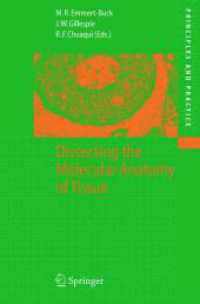- ホーム
- > 洋書
- > 英文書
- > Philosophy
Full Description
Mono no Aware and Gender as Affect in Japanese Aesthetics and American Pragmatism places the naturalistic pragmatism of John Dewey in conversation with Motoori Norinaga's mono no aware, a Japanese aesthetic theory of experience, to examine gender as a felt experience of an aware, or an affective quality of persons. By treating gender as an affect, Johnathan Charles Flowers argues that the experience of gendering and being gendered is a result of the affective perception of the organization of the body in line with cultural aesthetics embodied in Deweyan habit or Japanese kata broadly understood as culturally mediated transactions with the world. On this view, how the felt sense of identity aligns with the affective organization of society determines the nature of the possible social transactions between individuals. As such, this book intervenes in questions of personhood broadly—and identity specifically—by treating personhood itself as an affective sense. In doing so, this book demonstrates how questions of personhood and identity are themselves affective judgments. By treating gender and other identities as aware, this book advocates an expanded recognition of the how to be in the world through cultivating new ways of perceiving the affective organization of persons.
Contents
Introduction
Chapter 1: Mono no Aware in Motoori Norinaga's Thought
Chapter 2: The Poetic Cultivation of Mono no Aware
Chapter 3: The Normative and Social Dimensions of Mono no Aware in Experience
Chapter 4: The Aware of Gender in Literature
Chapter 5: Establishing the Ground of Aesthetic Personhood through John Dewey and Thomas Alexander
Chapter 6: Individuated Identity as an Aesthetic Process
Chapter 7: The Qualitative Unity of Gender and Offices
Chapter 8: Reconceiving the Kokoro: Reading Norinaga with Dewey
Chapter 9: Cross-Culturally Reconceiving Mono no Aware and Gender
Chapter 10: The Kata of Gender and the Do of Offices
Chapter 11: Aware as a Poetics of Gender








